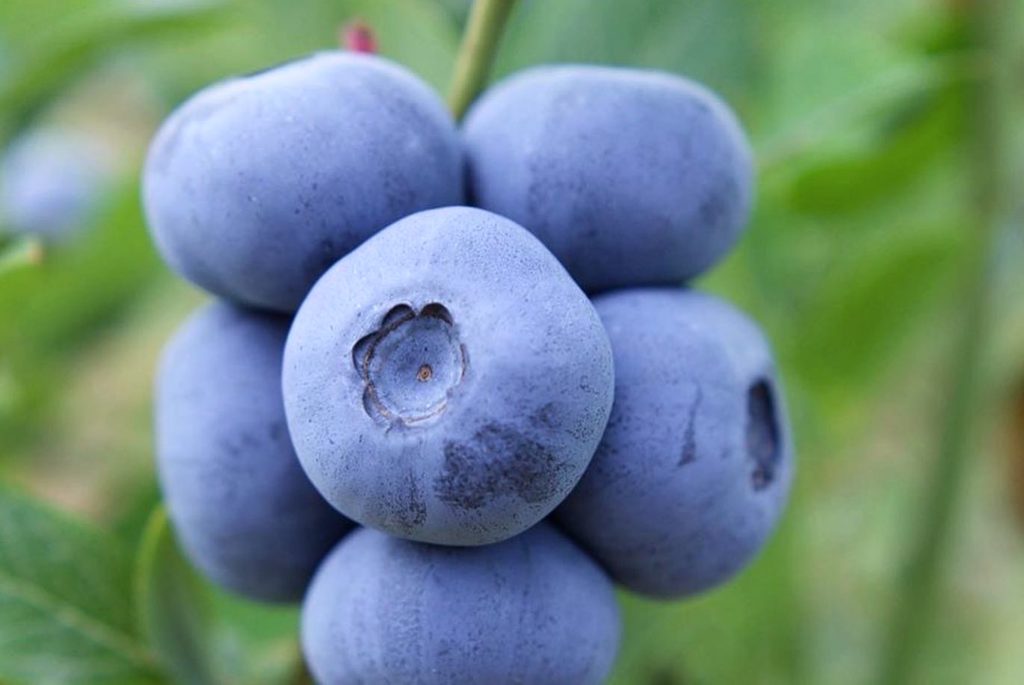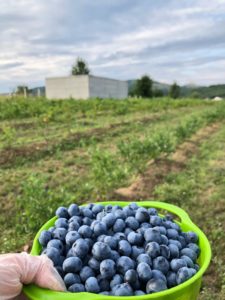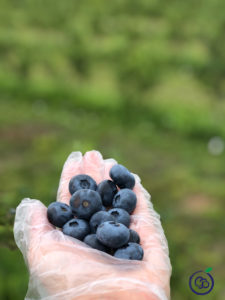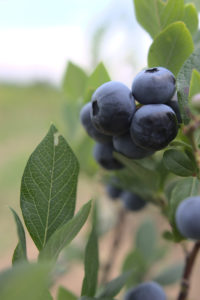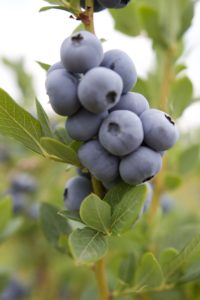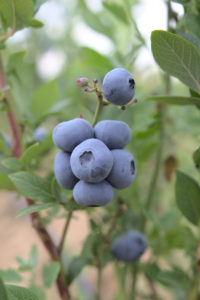Make sure your berry plants get the proper nutrients by using the best fertilizer for blueberry bushes.
| BEST OVERALL | BEST ORGANIC | BEST FOR BUDGET |
|---|---|---|
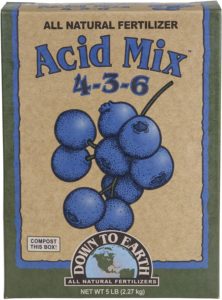 | 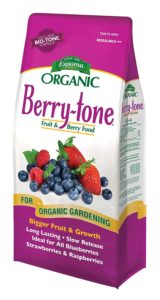 | 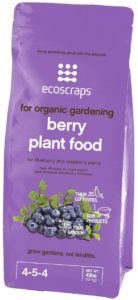 |
| Down to Earth Natural Acid Mix Fertilizer | Espoma Organic Fruit & Berry Food | EcoScraps Organic Berry Plant Food |
The superfood status of blueberries has helped a lot of people understand the importance it has on one’s health, thus giving this berry food the popularity it really deserves. In terms of growing blueberries in our personal experience the maintenance they require in comparison with other growing berries is less needy. However, the blueberry plants require special attention when it comes to choosing the best fertilizer for blueberries in order to get the best results possible and have healthy growth.
Blueberry bushes become a true pleasure to look at throughout their growing season in which they experience slight changes in form and color. These changes start in early spring when the blueberry bushes get covered by delicate white flowers and start turning light green slowly ahead of summer days.
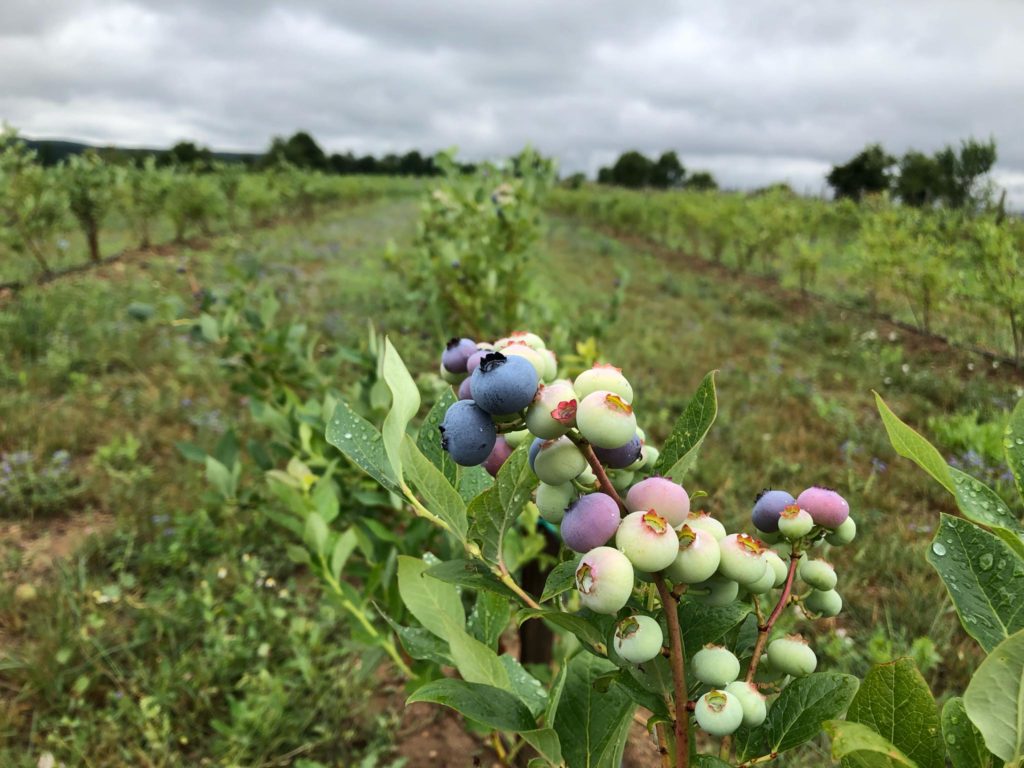
The photo is taken by Galaberry in our blueberry plantation. Copyright of Galaberry.
With so many blueberry fertilizer options available in the market, it can become a difficult task for gardeners or farmers to choose the right fertilizer for blueberries. Because we have been in the same situation ourselves and ended up trying various fertilizers for our farm we narrowed down the ones that delivered the best results for growing blueberries in different categories considering their formula composition, product specifications, and value.
Our Top Picks of the Best Fertilizer for Blueberry Bushes
- BEST OVERALL: Down to Earth All Natural Acid Mix Fertilizer
- BEST ORGANIC: Espoma Organic Fruit & Berry Food
- BEST INORGANIC: Miracle-Gro Water Soluble Plant Food
- BEST ACIDIFIER: Jobe’s Organic 9364 Fertilizer
- BEST BUDGET OPTION: EcoScraps for Organic Gardening Berry Plant Food
- BEST FOR BLUEBERRIES IN POTS: Espoma HT8 Holly-Tone
- BONUS PICK: Dr. Earth Organic Acid Fertilizer
What to Consider When Buying the Best Fertilizer for Blueberry Bushes
PH of Soil for Blueberry Plants
One of the most important aspects of growing blueberry plants is without doubt the pH levels of the soil in which you decide to grow your blueberries in. In our case, we tested the pH level of our soil using a soil test kit and had a professional at our farm do their testing to make sure that we are making the most out of fertilizing blueberries.
The higher the level of acidic soil, the easier the journey in growing them will be. A proper level of acidic soil removes the need to mix sulfur before planting blueberries. That’s why an optimal level of pH is considered between 4 and 5 making blueberries acid-loving plants.
Young blueberry plants will only flourish in acidic soils, and by nature, most of the soil is not acidic enough for blueberries likes, especially in the United States. However, in some areas, the soil acidity is above recommended values and thus its pH level needs to be brought down. This can be easily done by adding sphagnum peat to the plant base. If you don’t have sphagnum peat, you could sprinkle coffee grounds to the soil before planting the blueberry plants. The soil’s pH needs to be lowered in this way once per year.
One more thing that you need to keep in mind regarding soil pH is that applying fertilizer has an impact on the increase of soil pH levels. That’s why you need to choose a fertilizer that is appropriate for acid-loving plants and will help lower the soil pH of your blueberry plants.
Types of Fertilizer for Blueberries
There are different types of blueberry fertilizer options out there making it extra difficult to choose the one which suits your soil’s pH needs best. The primary consideration before buying one is deciding on the preferred type that fall under organic fertilizer and the inorganic ones. Below we will show you the differences between both options so you will have an easier time distinguishing the two, and narrowing down your pick.
Organic Fertilizers
Organic fertilizers are made up completely from natural ingredients, taken from animal and plant food. An organic fertilizer product has a slow-release formula that spreads for a longer period of time and is composed of many essential nutrients. When looking for organic fertilizers make sure you check products that contain the following:
- Fish meal,
- Blood meal,
- Bone meal,
- Powdered seaweed.
The nutrition sources listed above are rich in potassium and phosphorus which will help your blueberry plant growth. Coffee grounds and sphagnum moss will also serve as additional boosters to the acidic soil pH levels.
Inorganic Fertilizers
If you want to get faster results for your blueberry plant, then that’s where inorganic fertilizers come into play. The reason is that this type of fertilizer got all necessary macronutrients, in even higher amounts than those in the organic fertilizer.
If you will go for the inorganic fertilizer option make sure that you get products that contain ammonium sulfate and potassium sulfate which will enrich your blueberry plants with sources of nitrogen and potassium.
There is also another way of narrowing down the buying choice of blueberry fertilizer for your needs which comes down to your preferred form of fertilizer being in either liquid or powder and granular form.
Liquid Fertilizers
Liquid fertilizers are destined to be diluted in water and deliver results way faster providing the blueberry plants with essential nutrients. This form is the best in terms of delivering the fastest results since the blueberry plant absorbs nutrients from its root system by its first drop.
The only drawback of using a liquid fertilizer product is that they might wash up away by rainfall or in case of over-watering.
Powder and Granular Fertilizers
A powder and granular fertilizer can be a great addition to the excessive growth of your blueberry plants since they get sprinkled around the root of the blueberry plant providing a slowly distributed solution that gently dissolves into the soil. This option can be great for blueberry’s growing season in early spring when the blueberry bushes start blooming.
NPK Ratio in Blueberries
Macronutrients that are present in a plant fertilizer consist of nitrogen, phosphorus, and potassium each corresponding to the NPK chemical letter markup. These nutrients show the percentage of each of the nutrients that exist within the fertilizer. Blueberry bushes tend to have healthy plant growth when given a fertilizer that is high in nitrogen because it strengthens its root system.
However, when looking at a fertilizer for blueberries make sure to check its nitrates since calcium nitrate and chloride could have a blueberry bush killing effect.
Acid Fertilizer for Blueberries
People that are passionate about growing blueberries will oftentimes find themselves looking for acid fertilizers to increase the chances of success for their blueberry bush.
While this is more common for gardeners, farmers on the other hand do pre-preliminary tests to test their acid soil of the ground of their destined area for blueberry cultivation, so they have a bit more flexibility there.
A high acid fertilizer will lower soil pH, and help optimize acidity levels of these acid-loving plants.
Across different types of fertilizer products out in the market that contain acid what proved to work slightly better are fertilizers that have ammonium sulfate and sulfur coated urea in their composition.
Ammonium Sulfate for Blueberries
Ammonium sulfate does a great job of lowering the pH of soils, providing sulfur and supplemental nitrogen to blueberry plants. Apply fertilizers that contain ammonia sulfate three times a year and keep the amount at 1 ounce per blueberry bush in your first year.
Start increasing this amount to 4 ounces after the fourth year of growing blueberry bushes by spreading it around the bushes then watering the whole berry bushes during early spring.
How Much Sulfur to Lower pH for Blueberries
For every point that you want to lower the pH for blueberries, put 3/4 pound of sulfur in a 100 square feet area. Also, add 1 or 1/2 up to 2 pounds organic soil and 3-4 clay soil. Mix the added sulfur to the top layer of soil. To make sure that the process is efficient you will need soil with a pH not bigger than 5.
Sulfur is one of the most effective ways to lower pH for blueberries and provide the necessary blueberry bush care.
What is the Best Fertilizer for Blueberry Bushes
Our Top Picks Based on Test and Results
Growing berries is certainly no easy task for many gardeners, let alone farmers which even have a bigger responsibility on their shoulders, since they have to accommodate lots of land if they want to engage in proper fruit production.
Blueberries which are part of the small fruit family don’t make the job easier because of the delicate care they require all-year round. That’s why not all fertilizers are adequate, and we want to share with you the best blueberry fertilizer options that worked for us and what should work for you based on the information we provided.
1. Down to Earth All Natural Acid Mix Fertilizer 4-3-6, 5 Lb
| BEST OVERALL |
|---|
 |
| Photo is copyright of Amazon.com |
If your case involves lowering the pH levels of your soil and getting in the optimal acid range then the Down to Earth Acid Mix Fertilizer could be just what you need. This fertilizer contains nutrients destined to keep pH levels low. Nutrients include fish bone meal, kelp meal, feather meal, langbeinite, humates, and human acids.
The backbone is cottonseed meal and has been used traditionally on plants that prefer acidic soil, making it a perfect option for blueberries. Additionally, the richness in nitrogen and potassium from this fertilizer helps plant growth and fruit development.
This fertilizer comes in a 5 pound bag, however, there is a smaller option of the Down to Earth All Natual Acid Mix Fertilizer available at a 1 pound bag, which is ideal for people that want to try it out before committing to a bigger bag.
The Down to Earth team recommends applying fertilizers three times per year which we followed and weren’t disappointed by the results. The fertilizing should take place right after the first blooming starts in early spring, and during fall after harvesting finishes.
How to use: Rake lightly the area on your blueberry plant and sprinkle the necessary amount around the dripline. Lastly, dig in a bit and water it thoroughly. Don’t forget to repeat the process in early spring and after harvesting is done.
Product Specifications
- Organic fertilizer
- 5 pounds bag
- NPK ratio: 4-3-6
Pros
- Can be used for other acid-loving plants as well.
- Contains natural ingredients
- The package bag is bio-degradable
Cons
- The product might have a mild smell
2. Espoma Organic Fruit & Berry Food, 4-3-4, 4 Lb
| BEST ORGANIC |
|---|
 |
| Photo is copyright of Amazon.com |
Our top organic fertilizer pick is the Espoma Fruit & Berry Food which includes a lot of natural ingredients such as bone meal, feather meal, elemental sulfur, and sulfate of magnesia.
This fertilizer has a formula that slowly releases nitrogen into the soil of blueberry, making it a top option for all-year-round usage. Being one of the premium picks on the market you can expect healthy plant leaves on your blueberry bushes and flavorful berries.
If you want immediate results and are a person that believes in value for money, then you can’t go wrong with this fertilizer.
How to use: According to the manufacturer the fertilizer should be used at the beginning of spring and right after blueberry harvesting. Sprinkling is recommended at 1/4 up to 1/2 of the cup around the root of your berry bushes by highly raking it into the soil and pouring water at the end.
Product Specifications:
- Organic fertilizer
- 4 pounds bag
- NPK ratio: 4-3-4
Pros
- Can be used for strawberries, blackberries, and raspberries as well.
- Contains sulfur and magnesium which are highly nutritional
- Fast results
Cons
- Mild smell because of its all organic ingredients
3. Miracle-Gro Water Soluble Plant Food, 1.5 Lb
| BEST INORGANIC |
|---|
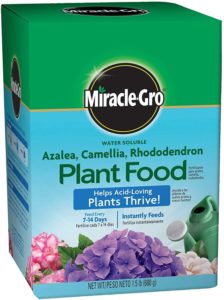 |
| Photo is copyright of Amazon.com |
Miracle-Gro is one of the most effective fertilizers when it comes to younger blueberry plants that need a lot of nutrition for a shorter period of time.
The fertilizer is adequate for acid-loving plants providing the blueberry plants the macronutrients that they need to have healthy growth. The formula of Miracle-Gro includes 30 % nitrogen, 10% potassium, and 10% of phosphorus.
This fertilizer is water-soluble and can be easily applied to the soil of your blueberry plants by taking 1 tablespoon of the fertilizer and adding it to the gallon of water before pouring it around the berry plant.
Younger blueberry plants don’t like to get over-fertilized since they tend to not perform well when nutrients such as sodium and phosphorus build up around the soil of blueberries.
How to use: Because the formula in the Miracle-gro fertilizer spreads quickly into the water, it can be used every two or couple of weeks by mixing the fertilizer into the water and spreading it around the base of your blueberries. However, make sure to not water the stems and plant leaves since they can be vulnerable to burning.
Product Specifications:
- Inorganic fertilizer
- 1.5 pound bag
- NPK Ratio: 18-24-16
Pros
- Water-soluble
- Fast results
- High in macronutrients
- Can be used for other acid-loving plants
Cons
- Contains synthetic ingredients
- Harmful for kids, and pets
4.Jobe’s Organic 9364 Fertilizer, 6 Lb
| BEST ACIDIFIER |
|---|
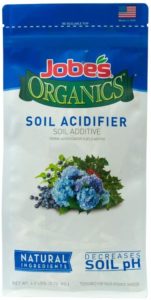 |
| Photo is copyright of Amazon.com |
On our best fertilizer list is another organic fertilizer that helps in adjusting the soil’s pH level during the season. Jobe’s organic fertilizer is made out of natural ingredients including elemental sulfur and gypsum.
We advise everyone to check pH levels of their soil before applying this product around your blueberry plant. Jobe’s Organic Fertilizer has sulfur in its composition that provides your plants with the necessary proteins to increase the chances of healthy blueberry bush growth.
While it’s safe for dogs to eat blueberries the smell this acidifier has will make your dog visit your blueberry plants more often, and have them enjoy a few more ounces of your tasty fruits without your consent.
How to use: If you’re using this product before planting your blueberry plant then the amount of pouring depends on the gallon pot. For example, if you have a 5-gallon pot with pH level 8, a pouring of 8 ounces is more than enough to get results.
If you want to improve the results of your already established plants then half up to 1 cup per foot of branch spread is enough. Make sure that you rake it into the soil at its top level.
Product Specifications:
- Organic fertilizer
- 6 pound bag
- NPK Ratio: 0-0-0
Pros
- Can be used for other acid-loving plants such as hydrangeas and azaleas.
- Doesn’t include any synthetic chemicals
- Safe for kids and pets
- Doesn’t cause any burn to the plant
- Lowers pH of soil naturally
Cons
- Your dogs and cats will be highly attracted to the smell
5.EcoScraps for Organic Gardening Berry Plant Food, 4 Lb
| BEST BUDGET OPTION |
|---|
 |
| Photo is copyright of Amazon.com |
Organic fertilizers have often a higher price tag making them a premium choice among other fertilizers in the market. However, we found an organic fertilizer that is budget-friendly and provides great results for your berry plants.
The EcoScraps organic fertilizer contains leftovers from food life cycle parts decreasing waste in landfills and offering a recycled organic fertilizer at a very affordable price. The formula of this recycled fertilizer is adopted to blueberries and not only, having balanced fertilization composed of nitrogen, phosphorus, and potassium.
This fertilizer is the ideal pick for gardeners that lookout for sustainable and less pricey options when it comes to the best fertilizer for their juicy berries.
How to use: The recommended application rate for this product per bag for new plants is pouring 1-2 cups on the top level of soil for 6″ of soil, for established plants, a 1/4 cup mix on the top of the soil, and for potted plants 2 tablespoons for 6″ or 1 cup for a 12″ pot.
Product Specifications:
- Organic fertilizer
- 4 pound bag
- NPK Ratio: 4-5-4
Pros
- Sustainable recycled choice
- An ideal formula for berries
- Affordable pricing
Cons
- Might have a mild smell
- Dogs can be attracted to the smell
6.Espoma HT8 Holly-Tone 4-3-4, 18 Lb
| BEST FOR BLUEBERRIES IN POTS |
|---|
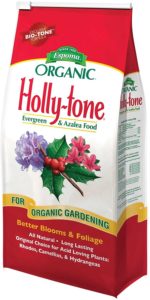 |
| Photo is copyright of Amazon.com |
According to our tests, the best fertilizer for blueberries in pots turned out to be the Espoma Holly Tone all-natural and long-lasting organic fertilizer. This fertilizer contains bio-tone microbes that are essential for the growth of plants, and its formula is specifically designed for plants that are acidic.
This organic fertilizer will help you increase pH levels and provide better blooming and foilage of your blueberry bushes. It can also be used on other plants that are acidic as well including strawberries, hydrangeas, evergreens, and others.
While this bag option provides great value for money, you can always try the Espoma Holly Tone 8 pound bag first before committing to the bigger one.
How to use: Use the fertilizer two times per year, during Spring and Fall and pour up to 2 cups for a 5-gallon pot to maximize the results of your bushes.
Product Specifications:
- Organic fertilizer
- 18 pound bag
- NPK Ratio: 4-3-4
Pros
- Can be used for various acid-hungry plants
- Safe for children and pets
- Great value for money
- Long shelf life up to 5 years
- Environmentally safe
Cons
- Might have a mild smell
7. Dr. Earth 703P Organic Acid Fertilizer, 4 Lb
| BONUS FERTILIZER PICK |
|---|
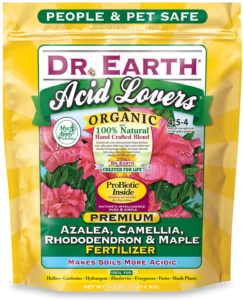 |
| Photo is copyright of Amazon.com |
Dr. Earth’s organic acid fertilizer is an all-natural ingredient option that provides amazing buds and blooming results for your blueberry bushes. Its NPK ratio of 3-4-3 is perfectly balanced, and the fertilizer contains fish meal, feather meal, and alfalfa meal which make it a great option for fertilizing blueberries.
Nutritients on this fertilizer are released pretty quickly and provide the plant with food for several months. Due to its 100% organic formula if used as instructed you don’t need to add any chemicals into the mix in order to achieve pleasing results.
Additionally, Dr. Earth’s fertilizer has Ecto Mycorrhizae which is fungi associated with the plant root, and Endo Mycorrhizae which is also a fungus related to the cells of the host. These two organisms help the plants absorb nutrients such as phosphorus which is one of the most important nutrients in plant growth.
How to use: The ease of use that this fertilizer provides and its value for money make it a popular choice for gardeners. You just have to sprinkle the necessary amount around your plant and then pour some water on it. This fertilizer has worked also for other acid-hungry plants that we have on our plantation such as azaleas, maples, hollies, hydrangeas, etc.
Product Specifications:
- Organic fertilizer
- 4 pound bag
- NPK Ratio: 3-4-3
Pros
- Lowers pH levels naturally
- Has ingredients that help in drought conditions
- Safe for kids and pets
Cons
- The smell can be unpleasant for humans
- Pets can be attracted to the smell
How We Selected the Best Fertilizer for Blueberry Bushes
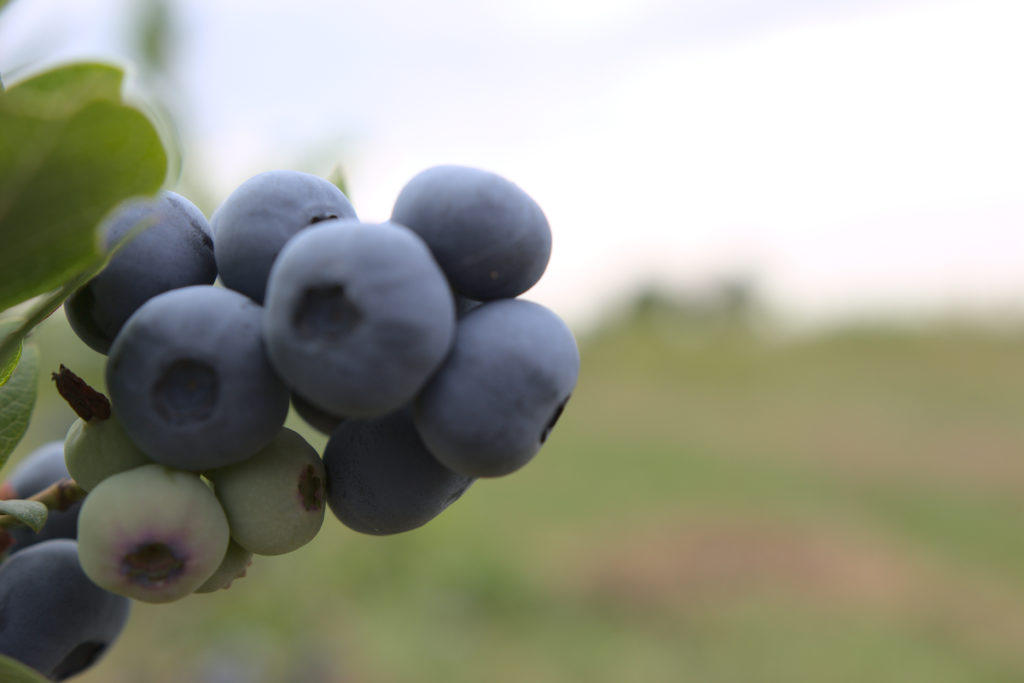 The photo is taken by Galaberry in our blueberry plantation. Copyright of Galaberry.
The photo is taken by Galaberry in our blueberry plantation. Copyright of Galaberry.
After years of growing and harvesting blueberries, strawberries, blackberries, and other acid-loving plants, our research on the best fertilizers on the market expanded to different categories for you to consider.
- Both organic and inorganic fertilizers provide advantages of their own to the customer, so that’s why we made sure to include both options in our guide to see which works best for you.
- Acidity is one of the most important considerations when it comes to growing blueberry plants, that’s why you have to check the pH levels of your soil first and then pick the most appropriate fertilizer for your needs based on our recommendations.
- Value for money is important to you as much as it is for us, that’s why we assessed the overall value and cost of our recommended products to make sure you save yourself money when choosing one of the options mentioned above.
- Pots can be the most common use case of growing blueberries or other plants in gardens, that’s why we carefully picked out for you fertilizers that perform well in containers also.
Our Verdict
After testing out different fertilizers for blueberries that are out on the market our top recommendation is the Down to Earth All Natural Acid Mix Fertilizer because of how nutrient-rich it is, and the great results it provides in balancing pH levels of your soil.
For those on a budget, the fertilizer that provides unbelievable value for money is the EcoScraps for Organic Gardening Berry Plant Food, which additionally is a sustainable choice that is organically recycled from natural leftovers.
When to Fertilize Blueberries
To ensure the steady growth of your blueberry plants, first, you need to start fertilizing them at the very beginning of Spring so their development proceeds as healthy as possible throughout their growing season. This yearly routine increases the likelihood of success for your blueberries because the plants absorb the nutrients early on, thus ensuring a boost in health benefits of blueberries in your garden or plantation.
If it’s your first 2 years of growing blueberries and your plants are relatively young then you can include an extra dose of fertilizer after 1-2 months of the first application, and another one at the end of Spring. On the other hand, if your blueberry bushes are already grown and planted on acidic soil then there is no need for you to further apply fertilizers.
For blueberry plants that are growing inside containers and have a high pH level it’s recommended to fertilize them for the remainder of the growing season, but not exceeding two months.
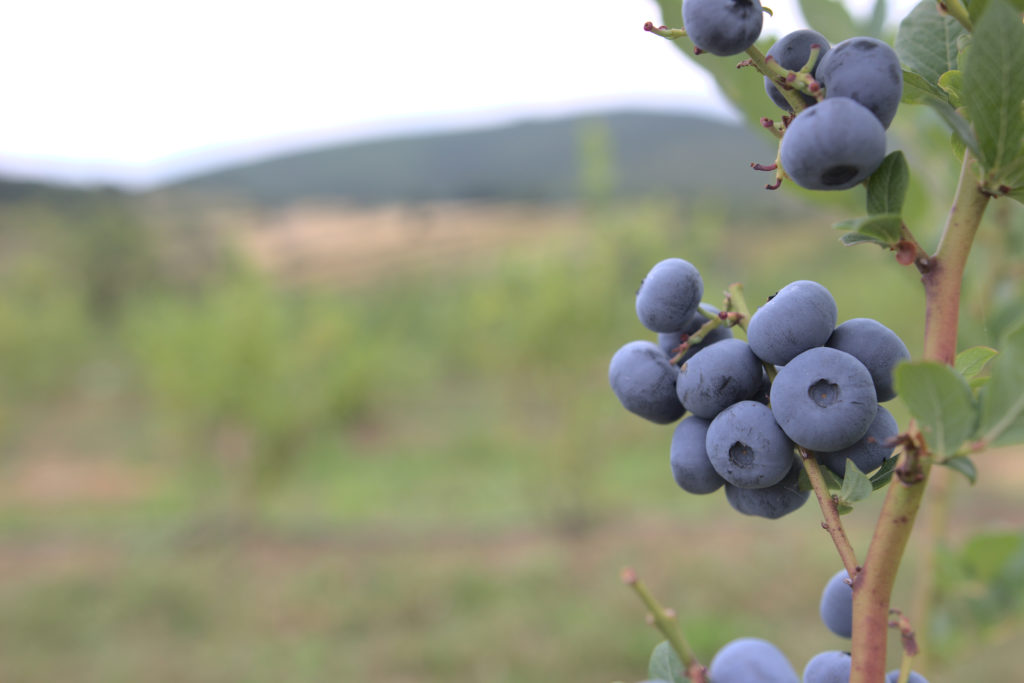 The photo is taken by Galaberry in our blueberry plantation. Copyright of Galaberry.
The photo is taken by Galaberry in our blueberry plantation. Copyright of Galaberry.
How To Fertilize Blueberries
Our years of experience in cultivating blueberries have taught us that loosening the soil around your base of blueberry plants before fertilization will provide better mixing of the fertilizer into the roots of the plant without damaging it, or causing harm to the foliage, branch, or stem. If you accidentally pour fertilizer on one of these areas make sure to brush it away immediately since it can cause burning to the plant.
In case of applied mulching in the off-season, we recommend removing mulch before spreading fertilizer around your plant. The mulch can be moved to the top of the soil right after you are finished with fertilizing so the nutrients will be pressed into the ground and root of the plant.
After you’re done applying fertilizers water the area thoroughly, and your plants will be good to grow.
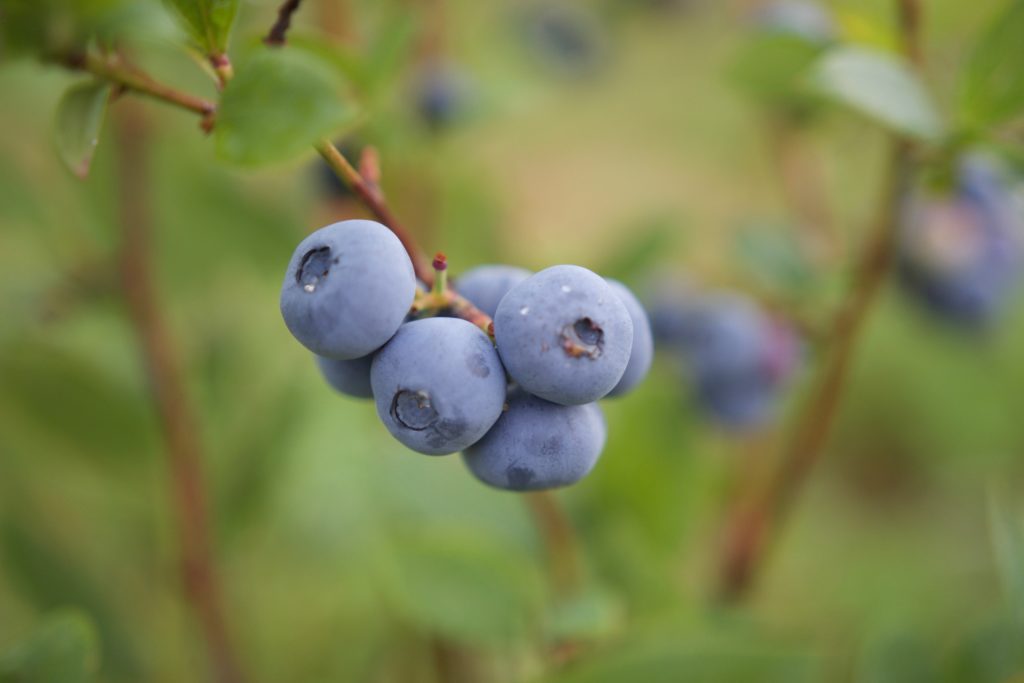 The photo is taken by Galaberry in our blueberry plantation. Copyright of Galaberry.
The photo is taken by Galaberry in our blueberry plantation. Copyright of Galaberry.
Final Thoughts
We hope that our comprehensive guide on the best fertilizer for your blueberries which find applications on other acid-loving plants too has helped you narrow down your buying choices.
Based on our personal experience we advise you to check the pH level of your soil and then choose one of the options on the list that best suits your farming or gardening needs. However, if you want to go for safe fertilizer options consider the all-organic Espoma Organic Fruit & Berry Food or Jobe’s Organic 9364 Fertilizer both of which always prove outstanding results.
Why Trust Us
We have several years of experience in planting, growing, and harvesting blueberries and not only. We have tried several fertilizers for our berries and based on the best results we provide you with our comprehensive guides. Learn more about Galaberry’s goals and passion.
Sneak Peek of Our Blueberries

A Bowl of Fresh Hand Picked Blueberries 
Freshly Harvested Blueberries 
Grown Blueberry Plant in Galaberry’s Plantation 
Galaberry Blueberries Grown Big 
Grown Blueberries in Galaberry Plantation
FAQs
Q. Are coffee grounds good for blueberry bushes?
Coffee grounds are high in acidity and could be used for blueberries and azaleas. However, if your soil has already a high level of nitrogen coffee grounds can negatively impact your blueberry bushes and stop their growth.
Q. What can you not plant near blueberries?
Tomatoes, Potatoes, and Eggplants do not have the same growing requirements that’s why it’s not recommended to have them planted near each other.
Q. How can I increase my blueberry yield?
Blueberries love the sun as much as they love water. If you provide these two then your plants will grow big faster and yield well.
Q. What month do you prune blueberry bushes?
The best time to prune blueberry bushes is right after winter-early spring when the intense cold is gone, and new blueberries start growing.
Disclosure: Galaberryblog.com is a participant in the Amazon Services LLC Associates Program which is an affiliate advertising program created for publishers to earn a commission if a product is bought through our Amazon.com links.

